

















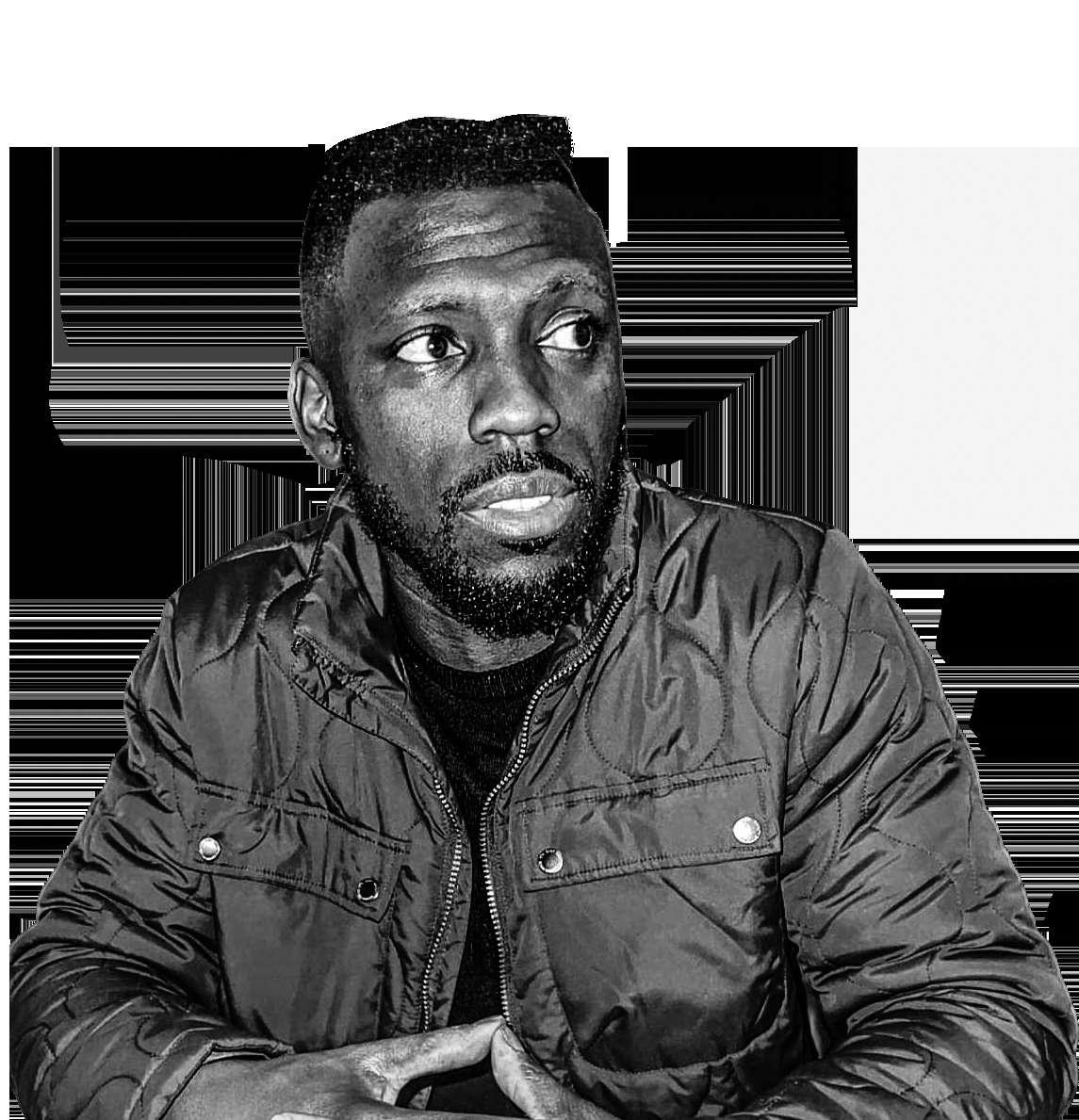








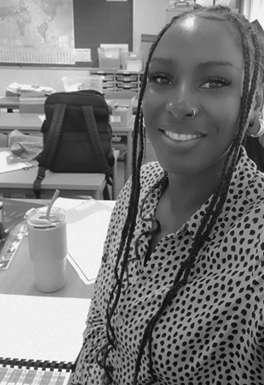
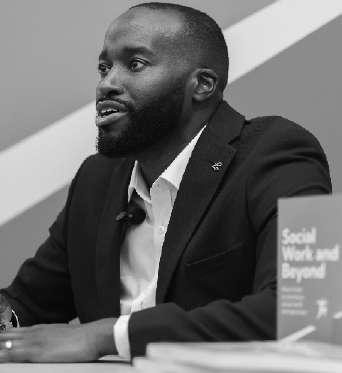
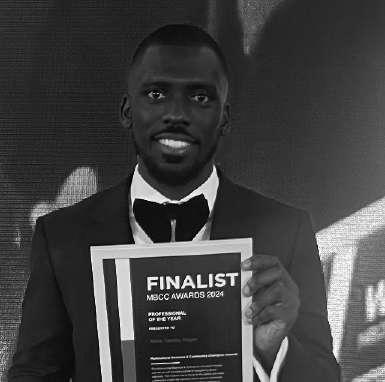


WThis issue is dedicated to celebrating the influential work of men in fostering and exploring the diverse roles they play, from Independent Reviewing Officers (IROs) and Social workers to trailblazing foster carers and creative contributors. Through powerful stories, insightfulcommentary,andmeaningfulconversations, we aim to dismantle misconceptions, challenge under
The role of men in fostering is pivotal, especially for children in care from racialized communities. Male role models bring unique perspectives, stability, and emotional support, often filling a void in a child’s life. However, societal misconceptions and traditional gender norms have led to a significant under representation of men in fostering, creatingmissedopportunitiesforchildren who could benefit from positive male representation,andinspirechange.
elcome to the third edition of Voice of the Alliance,whereweshineaspotlightonthe oftenoverlookedvoicesinthecommunity. influences.


By amplifying the voices of men in this space, we hope to challenge stereotypes andencouragemorementostepforward. Representation matters, particularly for children from diverse backgrounds who need caregivers who understand and reflect their lived experiences. When we broaden the narrative of who can foster, we create a more inclusive, supportive environment that truly meets the needs of everychild.

Weinviteyoutoengagewiththestoriesinthisissueandjoinusincelebratingthe incrediblecontributionsofmeninfostering.Together,wecancontinuetobuilda communitythatempowersallchildrentothrive.
RachelCole
Editor,VoiceoftheAlliance
Featurearticlesfromleadersand visionariesinthefosteringcommunity, sharingtheirinsights,experiences,and perspectives.



















We extend our heartfelt thanks and congratulations to Ascent Fostering for their unwavering commitment and dedication to fostering. Through their tireless efforts,theyhaveensuredthatthechildrenundertheir care receive the guidance, support, and safety they need to flourish. At Ascent Fostering, prioritising therapeutic care, safety, and cultural competency is thecornerstoneoftheirimpactfulwork.
The journey to achieving this prestigious recognition involves a comprehensive evaluationthatassessesanorganisation’s commitment to fostering an inclusive and culturally competent environment. The processincludes:
1.Self-Assessment:Organisationsconduct anin-depthreviewoftheirpracticesand policies against established cultural competency categories. This step encourages reflection and identifies areas of strength and opportunities for growth.
2.EvidenceSubmission: Organisations providedocumentationandexamplesto substantiate their practices. This may include policies, training programs, feedbackmechanisms,andcasestudies showcasing their impact on fostering diversityandinclusion.

At the end of the year, Ascent Fostering achieved a significant milestone by completingtherigorousprocesstoattain our Cultural Compass Award. This accolade recognizes organisations that demonstrate excellence in diversity, inclusion, and belonging, setting a gold standardinculturalcompetency.



3.InterviewsandReview: Key stakeholders, includingleadership,staff,andsometimes service users, participate in interviews to share insights and experiences. This qualitative assessment helps validate the organization’s commitment and effectiveness in implementing culturally competentpractices.
Ascent Fostering’s attainment of the gold standard is a testament to their exceptional workinpromotingdiversity, inclusion, and belonging. By embedding cultural competency into their operations, they have created an environment where children, families, and staff feel valued and supported.
Theirachievementreflects:
Astrongcommitmenttofosteringcultural awarenessandsensitivityintheircare practices.
Theintegrationoftherapeuticapproaches thatrespectandrespondtothediverse needsofchildrenandfamilies.
Aproactiveapproachtocontinuous improvementandlearning,ensuringthey remainattheforefrontoffosteringbest practices.

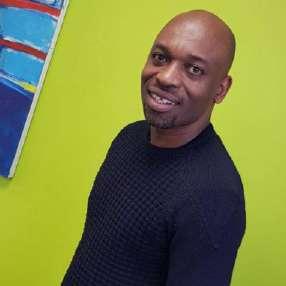

We applaud Ascent Fostering for setting a remarkable example in the fostering community.Theirachievementservesas an inspiration to other organisations striving to enhance cultural competency and foster a sense of belonging for all.
Congratulations once again to Ascent Fostering for this well-deserved recognition. Your dedication continues to make a profound difference in the lives of children and families, and we are honored to celebrate this milestone with you.


Ascent Fostering Agency is an Independent Fostering Agency (IFA) that supports foster carers across South-East and South-West London. At Ascent, we believe that children and young people who have experienced trauma, abuse andlossneedmorethandevelopmental, behavioural parenting or individual therapysessions.Therapeuticinessence, means ‘healing’ which allows children to recover from traumatic early life experiences, they are supported to emotionally regulate and can develop healthy and meaningful relationships.
Ascent’s therapeutic approach is underpinned by psychodynamic approaches, systems theories, social learning theory, attachment and loss theorieswhichaidusinunderstandingthe developmental and behavioural impact of loss and trauma on children’s emotional and behavioural well-being. This is supported and is in conjunction with Ascent values. Every child and foster carer we work with is unique and thus requires us to respond and tailor our therapeutic approach to their individual needs. Whilst wegroundourselvesinresearchand

theory, we employ different elements to inform our therapeutic practice and intervention.Webelieveinmakingareal difference to the children we work with, however, this only is achieved through us ‘walking in their shoes’ and being alongside them on their journey.
IIn 2022 and 2024 We have received an Outstanding rating from Ofsted. In addition,forthesecondtimeinarow, Ascent has received the Investors in PeoplePlatinumAwardin2024based on the consultation and feedback of fostercarersandstaff.
ThisplacesAscentinthetop2%ofUK organisations for practices around staff development, support, and leadership.
The context of our service is that we work with a diverse group of children, young people and foster carers in London in areas with a high level of multiple deprivation, and for commissioners and providers there arelimitedfostercarerresourcesinan urban city. This places significant pressure on foster families and on the childrentheysupport.

Ourvaluesandtherapeuticapproachunderpinourpracticeandprovidestaffandcarers with high-quality training and support, ensuring that our children thrive, achieve and buildlastingrelationships.Wehavebeenabletoachieveourexcellentlevelofplacement stability of over 90% and outcomes for children despite these challenges. Children’s outcomes are underpinned by the meaningful relationships formed between our carers, children,theAscentteamandthewrap-aroundsupportweprovide.
ALife-ChangingJourneytoSouthernAfricawithAscentFosteringAgency
In October 2024, we took several of our young people on a week-long residential trip to Gaborone, Botswana. This transformative experience fostered personal growth, independence, and resilience. Through cultural activities such as traditional cooking, storytelling, and language learning, the children embraced their heritage. One young person described it as, “I have connected to my roots.”

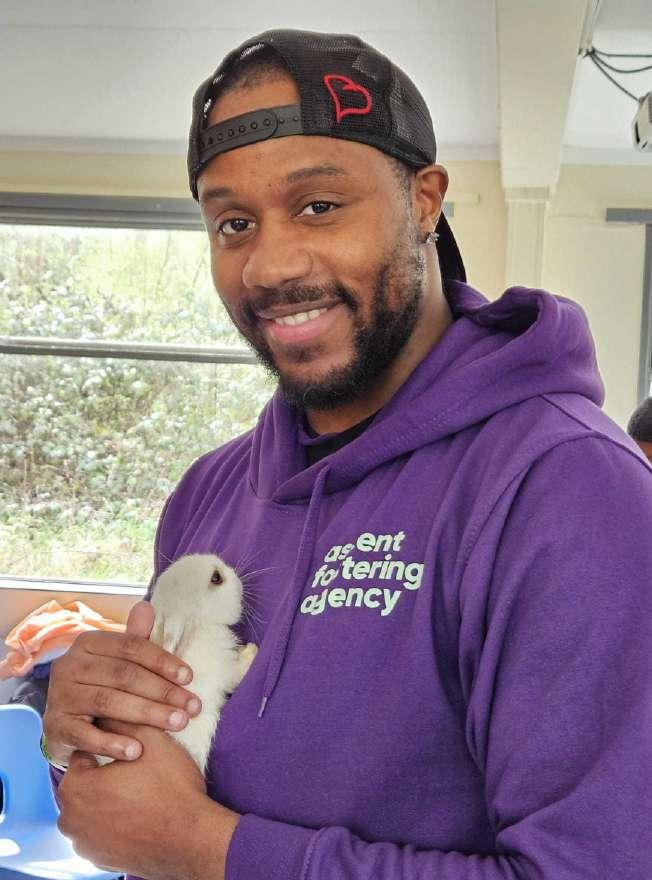
The trip also had an educational focus, including workshops on practical skills and outdoor activities like safari game drives, ziplining, and bushcraft. A visit to a local school and village deepened their cultural
At Baratani Primary School, our young people read to students and gifted themfootballs,books,andartsupplies. Witnessing the gratitude and resilience of the students left a lasting impact.



Traveling through South Africa and Botswana with six of our looked-afterchildren,aged13–16, was magical. For many, it was their first time abroad—or even on a plane. A buddy system ensured their safety and emotional well-being, creating a close-knit, supportive
environment. understanding.
In South Africa, we explored Mandela House and the Apartheid Museum, where the children engaged deeply with history. Botswana offered a stunning natural setting, and our camp’s “no phone” policy encouraged full immersion. The children bonded with local peers through football, storytelling, and sharedexperiences.
A particularly touching moment was when a young girl I’ve mentored for years told a local staff member I was her mother. It reinforced the deep, family-likeconnectionswebuildinour work.
This journey, made possible by the dedicationofourteam,wastrulylifechanging. As we returned home, we saw newfound confidence in each child—a powerful reminder of why we dowhatwedo.
Aparticularlytouchingmomentwas whenayounggirlI’vementoredfor yearstoldalocalstaffmemberIwas hermother.Itreinforcedthedeep, family-likeconnectionswebuildinour work.












Botswanaisalandwheretheearthwhispersstoriesofresilienceand beauty. In the vast stretches of the Kalahari Desert, where life seems
impossible,naturethrivesagainstallodds.
The Okavango Delta, a shimmering oasis in the heart of the desert, becomes a life-giving force, nurturing not only the wildlife but also
Here, the rhythm of life moves slowly, and the connection to the land feels deeply rooted as if the soil, sky, and creatures have always
sharedasecretbond. thespiritofthepeople.
In my view, Botswana stands out as a remarkable example of harmony between nature and human development and the country'sabilitytoprotectitsnaturaltreasureswhilefosteringgrowth is something truly admirable, making Botswana both a beacon of sustainable development and a heaven for nature lovers.






















































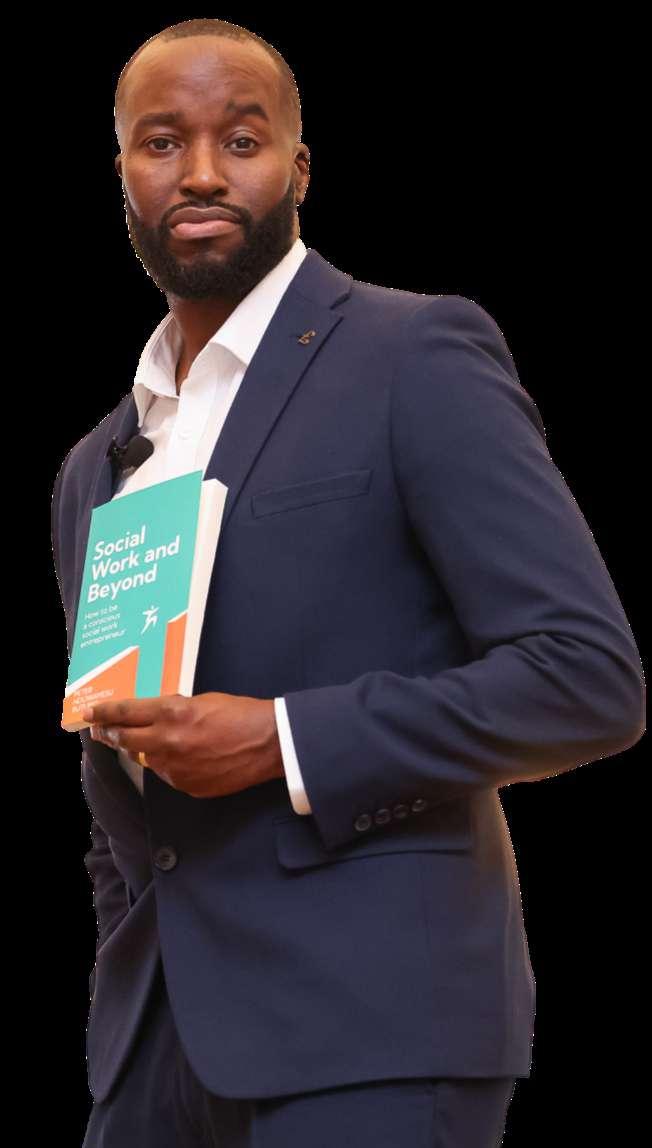





























In the realm of social care, where empathy and resilience form the backbone of the profession, men are often an underrepresented voice. Peter, a trailblazing social worker and author, ischangingthatnarrative.Throughhistransformative book,SocialWorkandBeyond,andhiscommitment to fostering innovation and empathy, Peter is no only inspiring change but also redefining how we view men in the sector.
Peter’s story is one of resilience, transformation, and dedication. Born in Kampala, he faced profound personal challenges, including the loss of his mother to a road traffic accident. These early experiences shaped his understanding of adversityandfueledhispassionfor makingadifference.

Peter’s journey into social work began when he pursued his degree at Birmingham City University between 2008 and 2011. Even then, the genderdisparityinthefieldwasglaring—hewas oneofjusttenmeninhiscohort.Thisimbalance highlighted a broader issue: the underrepresentation of men in social work and caregiving roles, an absence that often leaves a void in the lives of vulnerable children and families.
“Iwantedtobepartofthe change,” - Peter reflects.

We need more male social workers to bring unique perspectives, oversight, and nurture to the profession.” His career has been a testamenttothisvision,markedbyarelentless drive to challenge stereotypes and advocate forbetterrepresentation.
Social Work and Beyond is more than just a book—it’s a manifesto for resilience, self-awareness, and growth within the social care profession. Written from Peter’s personal experiences and insights, it provides a roadmapforsocialworkersgrapplingwiththe challengesoftheprofession.
Socialworkcanfeellikebeinginapressurecooker,”Peteradmits.“It’salonelyanddarkplaceattimes,but it’salsoapowerfulandessentialroleinsociety.”Throughhisbook,heaimstoremindsocialworkersoftheir
The book blends self-help strategies with practical advice, encouraging social workers to embrace self-care, find positive support networks, and stay committed to lifelong learning. Peter emphasizes that by takingcareofthemselves,socialworkerscanbettercareforthechildrenandfamiliestheyserve. purposeandprovidethemwiththetoolstonotjustsurvivebutthrive.

“Thisbookisacalltoarms,”Petersays.“It’sa guideforthosecommittedtotheserviceof humanity,showinghowsocialworkand entrepreneurshipcanintersecttocreate opportunitiesandpathwaysforgrowth.
ThelaunchofSocialWorkandBeyondwas acelebrationofcommunityandinnovation. Theeventfeaturedpaneldiscussionson resilience,entrepreneurialskills,andthefuture ofsocialwork.Highlightsincludedpractical advicefornewsocialworkers,reflectionson hopesfortheprofession,andactionabletips forbuildingresilienceinademandingfield.

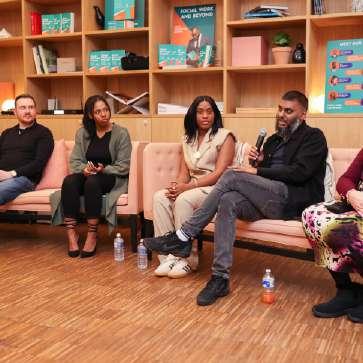
Attendeeswereinspirednotonly bythediscussionsbutalsoby Peter’sheartfeltinterview.He sharedhisjourneyfrom adversitytosuccess, recountingmomentsof personallossandtriumph. Hisadviceonstaying well—rangingfromorganizing one’sscheduletomaintaining ahealthysleeproutine—strucka chordwithmany.




Peter’sstorywasincrediblyinspiring.It’smotivatedmetothinkbeyond thestatusquoinmycareer.”
Thiseventwasawake-upcalltoexploremypotentialandeven considerwritingmyownbook.”
HearingPetertalkaboutnavigatingobstaclesandstayingdisciplined wasastandoutmoment.”
Peter’s work is helping to reshape perceptions of men in social care. Historically, caregiving roles have been seen as predominantly female, a stereotype that often discourages men from entering the profession. Peter challenges this narrative by emphasizingthecriticalrolemalesocialworkersplay,particularlyforchildrenincare whoneedpositivemalerolemodels.
Societyneedsmorementostepintonurturingroles,”Petersays.“Thisisn’tjust aboutfillingagap—it’saboutcreatingbalanced,diverseperspectivesthatbenefit everyone. ““ ”
Peter’s advocacy extends beyond social work into fostering. In his view, male foster carers can provide stability and emotional support that many children desperately need.Byamplifyingthesecontributions,Peterisencouragingmorementoembrace caregivingrolesandchallengingtraditionalgendernorms.
Forthoseinthesocialcaresector—orconsideringenteringit—SocialWorkandBeyondoffersablueprintfor thriving in a demanding but deeply rewarding profession. Whether you’re a seasoned practitioner, a newcomer, or someone at a crossroads in your career, Peter’s book provides the tools to navigate challengesandseizeopportunities.
“Thisisahandbookforanyonewhowantstomakeadifference,”Peterexplains.“It’saboutstayinginthe profession,growingwithinit,andexploringnewhorizons.”

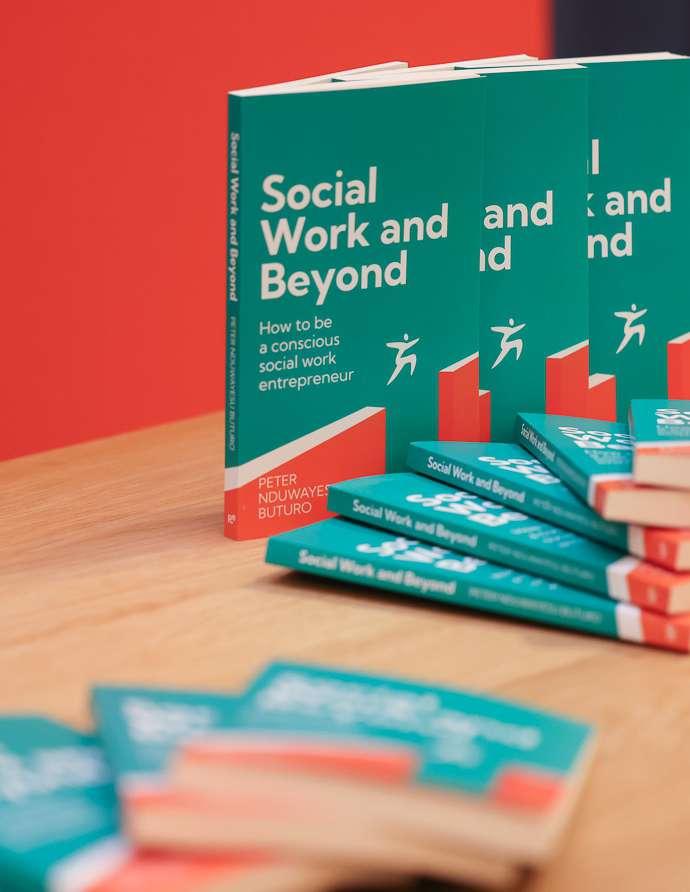

Peter’sjourneyandworkunderscoreapowerful message: empathy is a form of innovation. By sharing his story and championing change, he’s proving that social work is not just about addressing immediate crises but also about buildingsustainable,inclusivefutures.
Through Social Work and Beyond, Peter is inspiring a new generation of social workers to embrace resilience, self-care, and creativity. More importantly, he’s paving the way for a moreinclusivesectorwheremenarevaluedas integral contributors to the social care landscape.
As Peter puts it: “This is about rewriting the narrative—not just for men in social care, but for everyone who believes in the power of empathy and innovation to transform lives.”


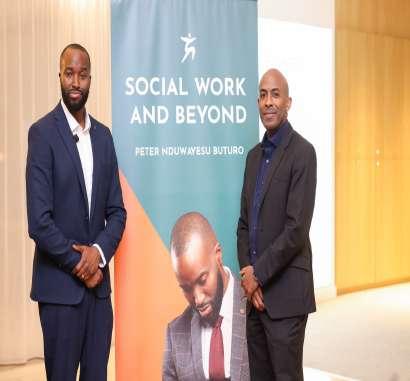

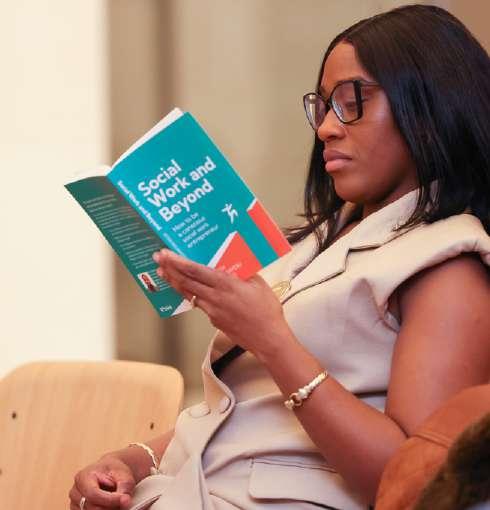

Peter’s work is a call to action for the sector. By breaking down barriers and challengingmisconceptions,he’screatingalegacythatwillinspirechangefor yearstocome.

OUTMORE


Language is a powerful tool, shaping how we see ourselves and others. In the fostering and social care sector, how we refer to individuals and communities matters. It reflects our commitment torespect,inclusivity,andequity.Butaslanguage evolves, so does the debate around the most appropriate terminology to describe racialized groups. From Black to Black and Minority Ethnic (BAME), Global Majority, and now racialized communities, the shift in language mirrors broader societal efforts to address power imbalancesandrethinkidentity.
The term Black gained prominence during civil rights and anti-apartheid movements, symbolising solidarity against oppression. Over time,BlackandMinorityEthnic(BAME)emergedin the UK but was criticised for homogenising diverse groups. The Global Majority sought to empower by acknowledging that people of color make up most of the world’s population, but it lackedresonanceforsome.



TheShiftto “Racialised Communities”
Recently,racialisedcommunitieshave gainedtraction,shiftingthefocusfromraceasan inherenttraittothesystemsthatconstructracialidentities. Unlikeminorityormajority,itavoidspowerimbalancesandcenters discussionsonsystemicpositioningratherthannumbers.
1. Focus on Structural Inequality: Acknowledges race as a social construct shaped by historical and systemic forces.
2.Inclusivity:Avoidstreatingdiversegroups as a monolith, respecting unique lived experiences.
3.Power Redistribution: Moves beyond the minority-majoritydynamic,fosteringequity -basedconversations.
Language is personal. Not everyone identifies with broad terms, and some prefer descriptors tied to ethnicity, culture, or heritage. The best approach is simple: ask individuals how they wish to be referred to.
As fostering and social care professionals, our words shape experiences. Let’s engage in this dialogue with openness, recognising that while language matters, intention and respect matter most.

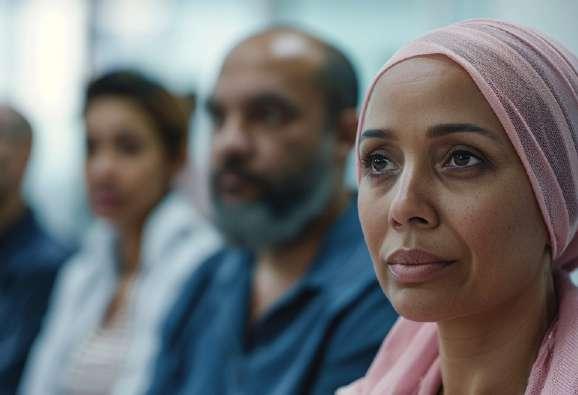


Personalstoriesandexperiences fromfostercarers,care experiencedadultsandothersin thefosteringcommunity, highlightingstrength,resilience, andsharedjourneys.
Jerrel Jackson’s path to becoming a foster carer wasn’t a fast-track process. It was a thoughtful, deeply personal journey shaped by his life experiences, values, and an unwavering commitment to making a difference. As a single Black man, Jerrel understood the challenges he might face, but his passion to provide a safe and lovinghomeforayoungpersonwasstrongerthan anyobstacle.
For Jerrel, the first step was finding an agency that aligned with his beliefs and values. He wanted an organisation that shared his passion for fostering, respected his background, and was committed to addressingtheunderrepresentationofBlackcarers and the overrepresentation of Black children in care. The decision wasn’t taken lightly—he took his time researching, asking questions, and ensuring thattheagency’sethosmatchedhisown.
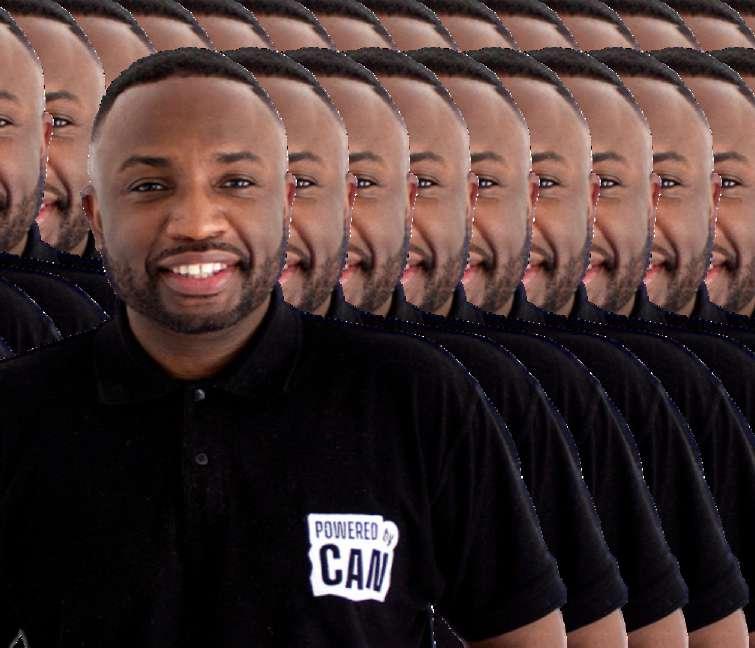
“ Jerrel
I knew I needed an agency that understoodme,myculture,and the importance of providing a space where a young person couldfeelseenandvalued,”
explains.

Jerrel’sdesiretofoster wasdeeplypersonal. Havingexperienced
bereavement at a young age, he learned early on what it meant to navigate lifewithoutaguidinghand. “I had to find my own way with little support,” he shares. This experience shaped his empathy an resilience and ignited a desire to be the kind of support system he wished hehad.
For years, Jerrel worked withyoungpeople,gaining invaluable experience in understanding their needs, challenges, and potential. He saw the negative n a r r a t i v e s o f t e n associated with Black children in society and felt compelled to help rewrite those stories. “I wanted to be a source of hope and guidance, someone who could shape a young person’s future positively,” hesays
Jerrel’s fostering journey was not straightforward. The process of approval, particularly the Form F assessment, was rigorous and, at times, emotionally taxing. “It’s not like Formula 1,” he jokes. “There’s no speeding through it.”
Having the right social worker was crucial. “I needed someone who wasn’t judgmental, someone who truly wanted to understand my background and build a positive rapport,” Jerrelrecalls.Agoodsocialworker,hebelieves, uses professional curiosity not as a means of interrogation but as a way to foster understanding, respect boundaries, and commit to having the hard conversations that comewithfostering.
Jerrel also emphasizes the importance of seekingsupport.“Don’tbeafraidtoaskforhelp or find a mentor to guide you when things get tough,” he advises. Having someone to lean on can make all the difference, especially for new foster carers navigating the complexities of the role.

Today, Jerrel is an approved foster carer with a young personinhiscare.Thejourneyhasn’tbeeneasy,butit has been deeply rewarding. “Fostering has given me a chance to give back, to use my experiences to createabetterfutureforsomeoneelse,”hesays.
His advice to prospective foster carers is simple but powerful: take your time to find the agency that suits youbest,beopentolearning,andremaincommitted tothewell-beingofthechildinyourcare.
For Jerrel, fostering isn’t just about providing a roof overayoungperson’shead.It’saboutofferingthema sense of belonging, understanding, and hope. And in doing so, he’s not only changing their life—he’s transforminghisown.

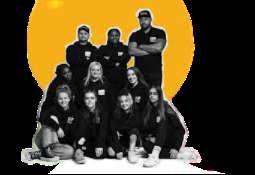


www.poweredbycan.org

NanaYabbey-Haganisanamethatis makingwavesinthesocialworksector,a professionthatrequiresadelicatebalance ofpassion,resilience,andacommitment tobreakingthroughbarriers.
As an influential figure, Nana's career journey embodies the drive to uplift, change, and empower, with a focus on diversity, representation, and challengingthestatusquoin a field that deeply impacts society His achievements, including his viral podcast, TheSocialWorker&theMentor,havemade him a beacon for those who seek change within social care and child protection. Nana’s work highlights the importance of having diverse voices and leadership in social work, advocating for systemic reforms that create a better environment for both social workers and the vulnerable communitiestheyserve
Nana is also a University Lecturer and mentor to Social Work Students and Newly Qualified Social Workers This role underscores his dedication to shaping the next generation of professionals, equipping themwiththeskillsandconfidenceneeded to thrive in a challenging yet rewarding field His mentorship ensures that upcoming social workers are not only well-prepared but also inspired to make meaningfulcontributionstotheprofession.
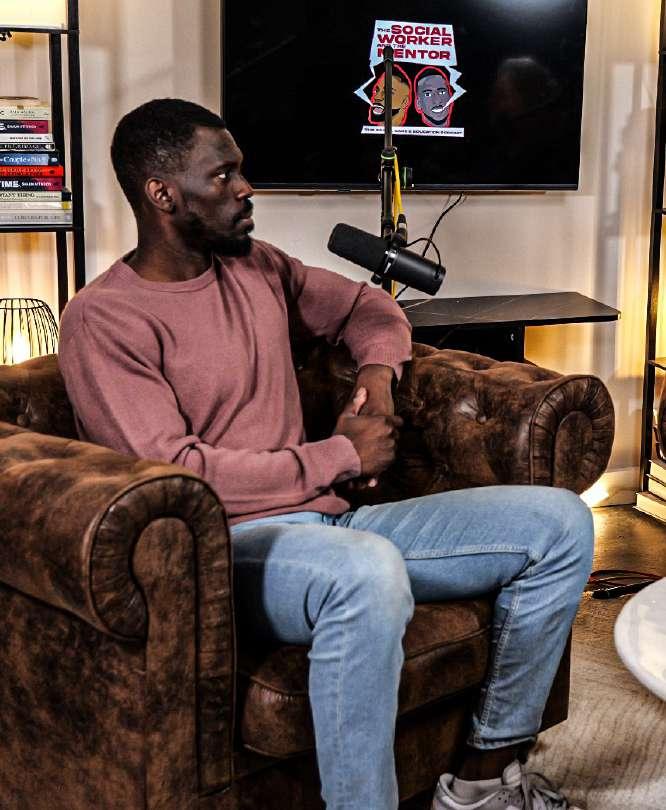
Throughout his career, Nana has earned numerousaccolades,cementinghisstatusasa rising leader in the field. His podcast, The Social Worker & the Mentor, was nominated for a prestigious journalism award, a testament to the impact he is having on the sector. He was also nominated for an "Amazing Social Worker" award, which recognizes individuals who have made significant contributions to social care. Beyond these accolades, Nana has served on the national executive board of the social work professional association and has had the opportunity to speak at events with key figures, such as the Chief Social Worker for the UK. These milestones reflect the respect he has earned within the sector and his growing influenceasachampionforchange.
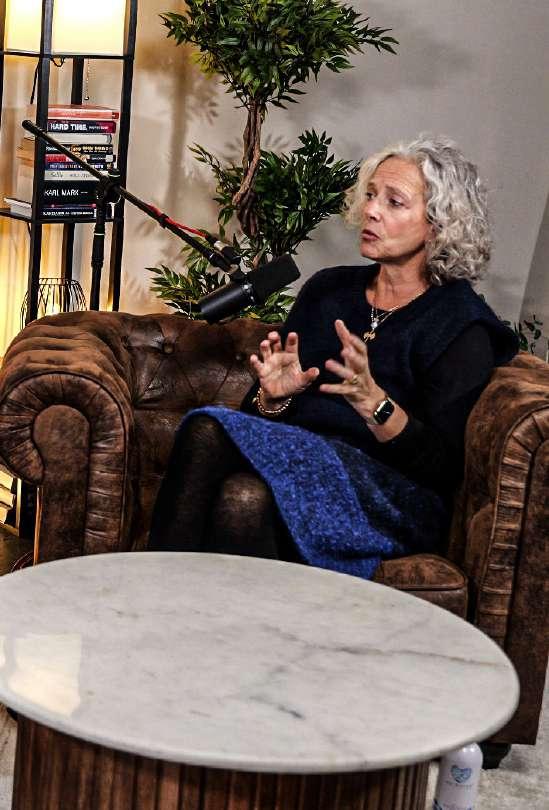
One of the standout moments in Nana’s journey, and a significant milestone in his career, was his podcast, The Social Worker & the Mentor, where he spotlighted important figures in the field, includingnoneotherthanIsabelleTrowler, the Chief Social Worker for Children and Families. This interview marked a pivotal moment in the podcast’s rise and was integral in highlighting the intersection of leadership, policymaking, and the future ofsocialwork.
IsabelleTrowler,atrailblazerinsocialwork, has long been an advocate for systemic change and improving social care practices. Her vision and leadership have influenced much of the social work landscape in the UK, particularly in her role as the Chief Social Worker, where she has been at the forefront of driving policies that impact children and families nationwide.
Through her work, she’s tackled some of the sector'smostpressingissues,includingimproving thewellbeingofsocialworkersandensuringthat
children in care receive the support they need. Her appearance on The Social Worker & the Mentor podcast servedasanenlighteningconversationthatbridgedthe gap between high-level policy and the ground-level workdonebypractitioners.

For Nana, having someone like Isabelle on his podcast was more than just a moment of professional recognition; it was an opportunity to elevate the discourse surrounding social work. Her insights brought clarity on how policy, practice, and leadership must intertwine to create sustainable change. She shared the complexities of her role and the ongoing challenges she faces in the public sector, particularly around improving the working conditions of social workers and promoting diversity at senior leadership levels. Their conversation highlighted the need for mentorship, for encouraging more Black and minority ethnic professionals to rise through the ranks, and for creating a nurturing environmentwhereeverysocialworkerisempoweredto thrive.
This conversation between Nana and Isabelle Trowler resonated deeply within the social work community, particularlyforthosewho,likeNana,arestrivingtobreak barriers. It provided invaluable insights into the systemic issues that continue to plague the social work sector. Nana, with his deep understanding of the field and his ability to amplify voices that matter, used his platform not just to learn from experts like Trowler, but also to empowerhisaudiencetotakeaction.
The collaboration between Nana and Isabelle, especially giventheirsharedvisionfordiversityandtransformation within social work, cannot be overstated. Trowler’s influenceandtheleadershipsheprovidesarepivotalfor the future of social work. Her focus on reshaping the profession and ensuring social workers are not only well-supported but also truly representative of the communities they serve, is closely aligned with Nana’s own goals. Both are visionaries who see the potential for a more inclusive, empathetic, and effective social work system, one that serves children, families, and communitiesinthemostmeaningfulwaypossible.
Their conversation on The Social Worker & the Mentor podcast sparked a wider conversation about the future ofthesector—howitcanbettersupporttheprofessionals who work tirelessly to support society’s most vulnerable, and how social work can evolve to meet the challenges ofarapidlychangingworld.It’sanimportantintersection
ofideas:leadership,systemicreform,andthepersonalpassionthat drives social workers like Nana to continue the work of shaping a betterfutureforall.
By hosting Isabelle Trowler and other notable figures in social work, Nana has been able to cultivate a platform for challenging the status quo, discussing policies, and engaging with the next generation of social work leaders. His podcast isn’t just a space for reflection, but a call to action. It encourages current practitioners, students, and those in the sector to think critically about the future of social care. With guests like Trowler, The Social Worker & the Mentor podcast is becoming a pivotal voice in the sector, one that reflectsthechangesneededandtheconversationsthatneedtobe had.
By hosting Isabelle Trowler and other notable figures in social work, Nana has been able to cultivate a platform for challenging the status quo, discussing policies, and engaging with the next generation of social work leaders. His podcast isn’t just a space for reflection, but a call to action. It encourages current practitioners, students, and those in the sector to think critically about the future of social care. With guests like Trowler, The Social Worker & the Mentor podcast is becoming a pivotal voice in the sector, one that reflectsthechangesneededandtheconversationsthatneedtobe had.


This collaboration is a testament to Nana’s unique ability to bridge thegapbetweenpracticeandpolicy,empoweringthoseworkingon the ground level while simultaneously advocating for systemic changes at the leadership level. Through the podcast and his work as a mentor and social worker, Nana Yabbey-Hagan is proving that the power of social work lies in the intersection of lived experience, leadership, and policy reform a notion that will undoubtedly continue to guide his path as he works towards the senior leadershiprolesheaspiresto.
Beyond the podcast, Nana’s approach to social work is firmly rooted inaphilosophythatsupportsyouthdevelopmentandadvocatesfor real, tangible change. He has consistently called for more funding and resources for early intervention, youth programs, and family support services. His belief is simple: preventing children from entering the care system through early intervention is key to changing their futures. Nana advocates for more manageable caseloads and better working conditions for social workers, so that they can focus on the hands-on, life-changing work that will help familiesstaytogetherandflourish.
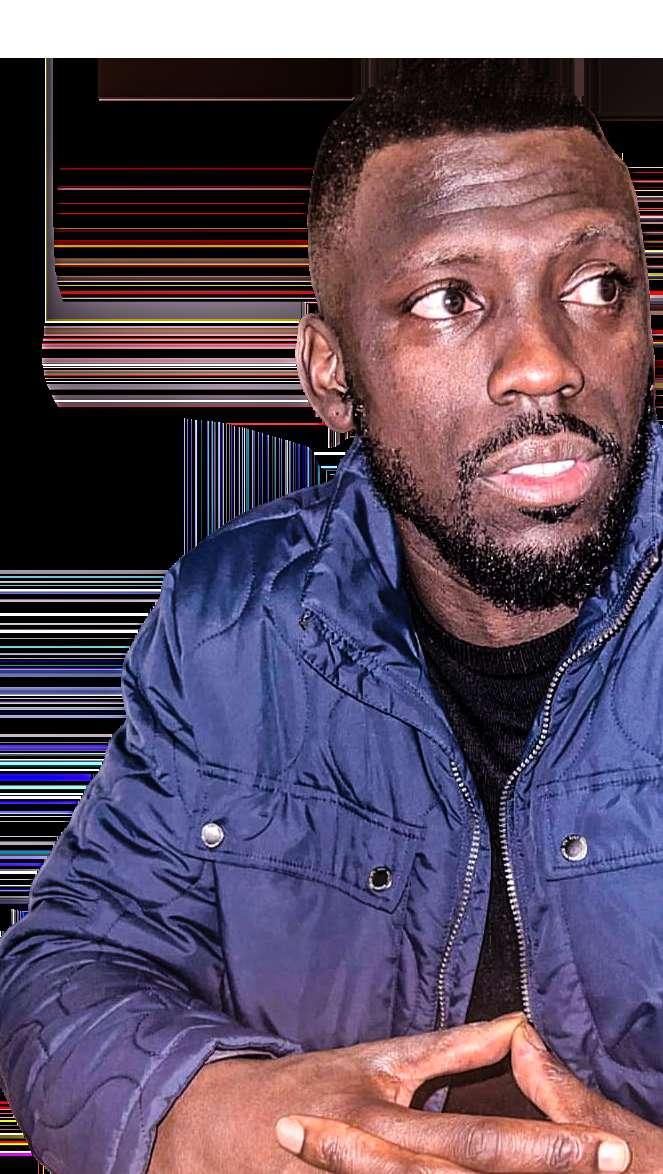
But Nana’s vision doesn’t stop at the structural changes neededwithinthefield;he but a reality. His goal is to seemoreBlackandminority ethnic leaders in senior socialworkroles,whichis essential for ensuring the
alsoenvisionsafuturewhere diversityisnotjustabuzzword, profession truly represents the communities it serves. Nana’s own career trajectory, as he rises to more senior leadership positions, is a testament to the importance of having leaders who understand thecomplexitiesofthesecommunities.
Nana’s own career path is a shining example of what can beachievedwhendeterminationandpurposealign.Hehas set his sights on becoming a Director of Children’s Services or even a government minister responsible for social care policy. He is committed to ensuring that the policies made at the highest levels serve the communities that need them most. By breaking through into these top positions, Nana hopes to shape the future of social work and drive the reformsthatareessentialtosupportingthenextgeneration of social workers and the children and families who depend ontheirexpertise.
Nana Yabbey-Hagan’s journey should be an inspiration to many in the social work field. His podcast, his leadership, and his tireless advocacy for change continue to inspire and challenge the status quo. Through his work, he has alreadymadeanindeliblemarkontheprofession.Withthe support of leaders like Isabelle Trowler and the growing recognition of the need for systemic reform, Nana’s vision for the future of social work is one that not only celebrates diversity and inclusion but also creates a stronger, more effective support system for children, families, and social workers alike. His commitment to pushing the boundaries, to elevating diverse voices, and to transforming the future of social care is a cause worthy of celebration—and one thatweshouldallrallybehind.



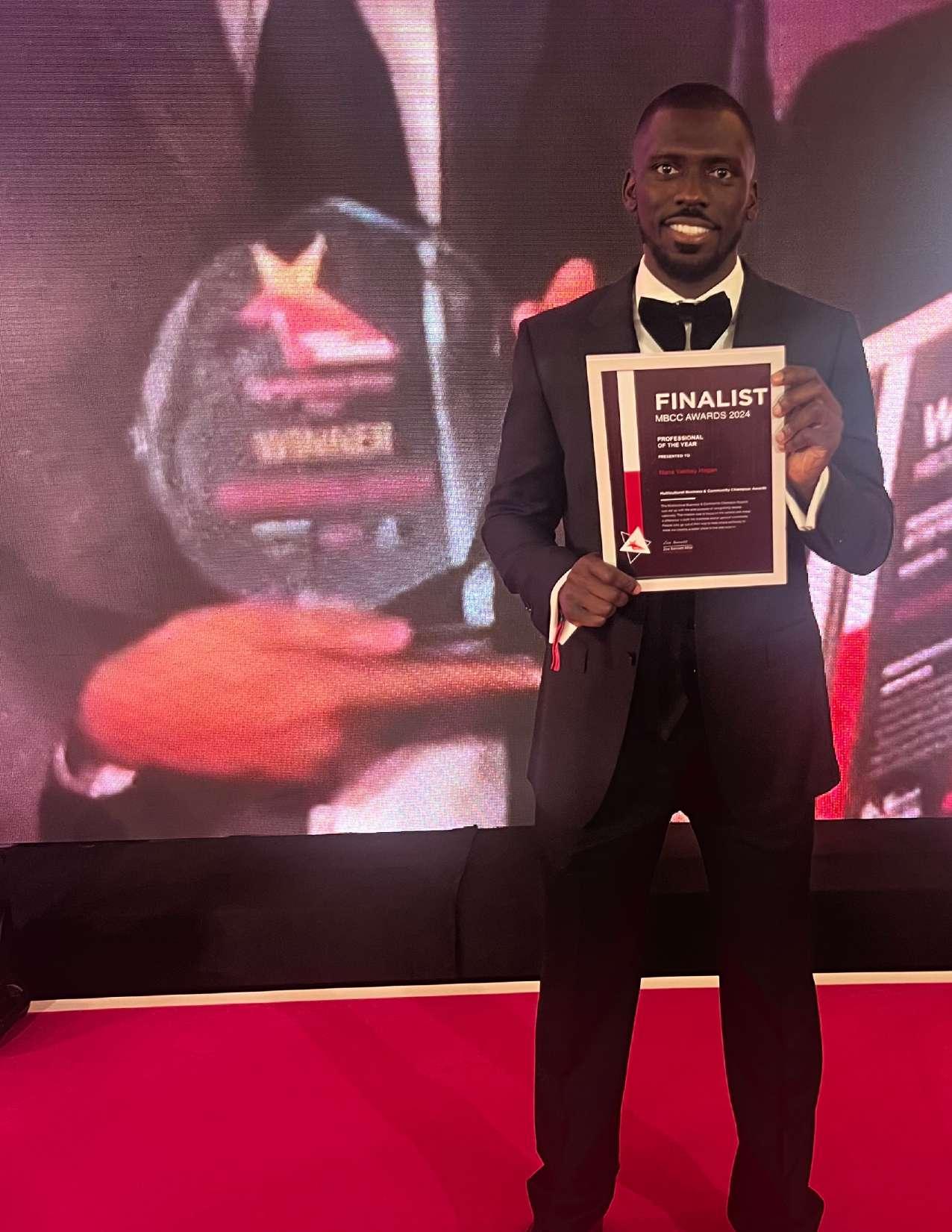




































































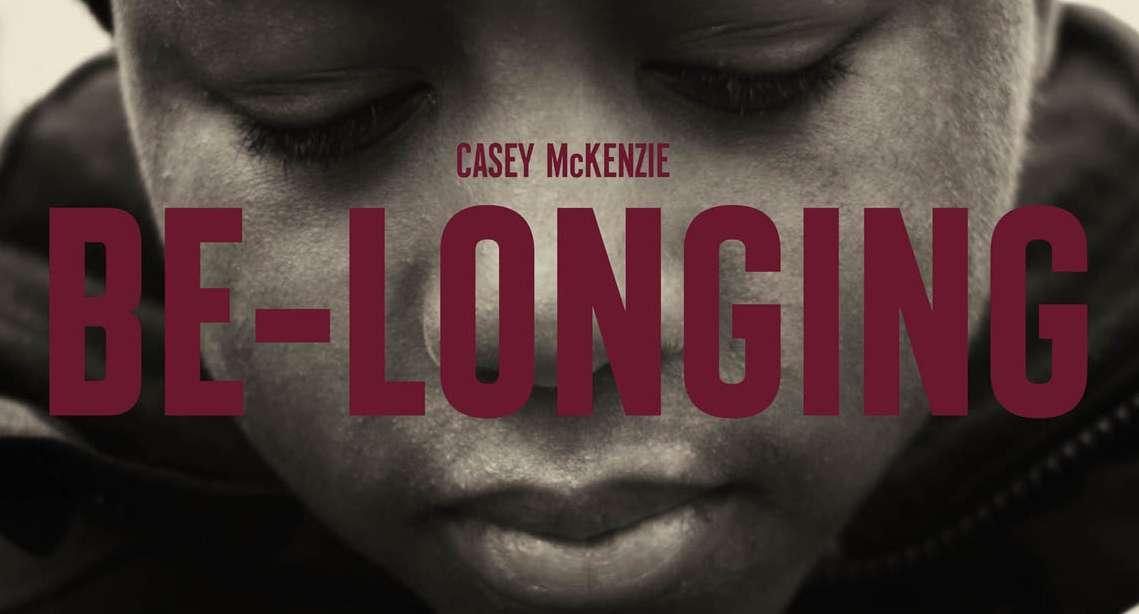
A seasoned foster carer with over two decades of experience, Mike Mckennzie has seamlessly blended his personal journey with his professional endeavors, notably through his award-winning short film, Be-Longing. (MAD4Films)


ike’s journey into
fostering began over two decades ago,
driven by a deep-seated desire to provide stability and love to children in need.
Alongside his wife, Carol, he hascaredforover30children, offering them not only a home but also the guidance needed to navigate life’s challenges. The couple also made the life-changing decision to adopt, further cementing their commitment
Drawing from his own family’s history with informal fostering, Mike recognized early on the unique role men could play in this space. “It’s so important for children, especially Black children, to see positive male role models who look like them,” he explained. “It reinforces their sense of identity and shows them what’s possible.” As my dad did for me.
Beyond fostering, Mike’s impact on young people extends through his work as a music educator and youth worker. With over 30 years in the music industry and 19 years teaching drumming, Mike has
to creating a family that fosters love and stability. In addition to his role as a foster and adoptive parent, Mike is the father of a biological child, which brings a unique dynamic to his household. “Fostering has enriched our family in ways I never imagined,” he shared in a recent interview. “It’s not just about what we give to the children we care for—it’s also about what they teach us in return.”
used rhythm as a tool for healing and expression. He has worked extensively with pupil referral units, helping children excluded from mainstream education find their voice and confidence through music.
His drumming workshops, often described as transformative, provide young people with more than just technical skills—they offer an outlet for emotions, a sense of achievement, and a way to connect with others. “Music is a universal language,” Mike says. “It helps kids process their feelings and gives them a positive focus.”



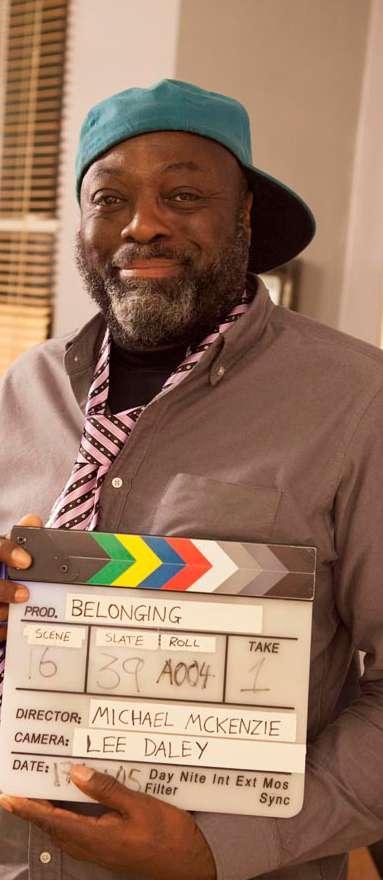
Mike’screativeworkreachednewheightswiththe releaseofBe-Longing,apowerfulfilmthatcapturesthe emotionalcomplexitiesoffosteringthroughtheeyesof anine-year-oldboy.
The film, celebrated at international festivals, has become a tool for raising awareness about the foster care system and the importance of empathy in supporting vulnerable children and this film helps you see things from the Childs perspective.
Through Be-Longing, Mike aims to challenge stereotypes about Black families and foster carers, showcasing their resilience and capacity for love. “Representation matters,” he emphasizes. “Black children need to see themselves in stories of care and success. It changes how they see their potential.”
Mike was frank about what advice he would offer other men, to engage in fostering and social care roles. As he recognises the shortage of not only foster carers and social workers also. He spoke openly about the challenges male foster carers face, including the tendency for systems to default to engaging with female partners, but also a b o u t t h e u n i q u e contributions men can bring.


“Children need to see strong, positive male figures who can guide them and show them what a good man looks like,” he explains. “For Black boys especially, seeing a Black man who cares, who listens, and who leads by example can be life-changing.”
His advice to men considering fostering is clear: “Just start the conversation. Talk to someone who’s doing it, learn about the process, and don’t let fear hold you back. It’s one of the most rewarding things you can do.”
As Mike looks to the future, his plans include creating more films that explore the nuances of foster care and continuing his work with young people. Whether through music, film, or fostering, Mike’s mission remains the same: to inspire change and empower the next generation. “It’s about creating a legacy,” he says. “If I can make a difference in even one child’s life, then it’s all worth it.”
Mike not only uplifts children but also challenges society to reimagine the role of Black men in care and community building. For those considering fostering or working with young people, Mike’s message is simple: the time to act is now.
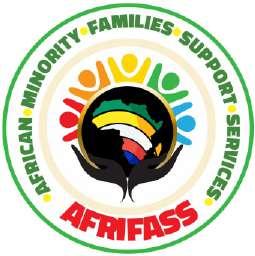

BYKWAKUAFRAM
In 1999, as a young man entering the University of Ghana, I had a singular dream: to become like Kofi Annan, the Ghanaian-born Secretary-General of the UnitedNations. His vision for diplomacy, advocacy, and global peace inspired me to pursue a degree in social work at the University of Ghana. I saw social work as a pathway to creating meaningful change and addressing the structural inequalities affecting communities. My journey began there, and I graduated with First Class Honours, an achievement that opened doors for me to contribute as a teaching and research assistantattheUniversityofGhana.
As part of my national service, I worked at the School of Social Work in Osu,Accra, where I taught part-time. These early experiences strengthened mycommitment to improving the lives of vulnerable people and sharpened my skills in community engagement, education, and research. However, I realised that my ambition for global impact required me to seek further knowledge and opportunities.
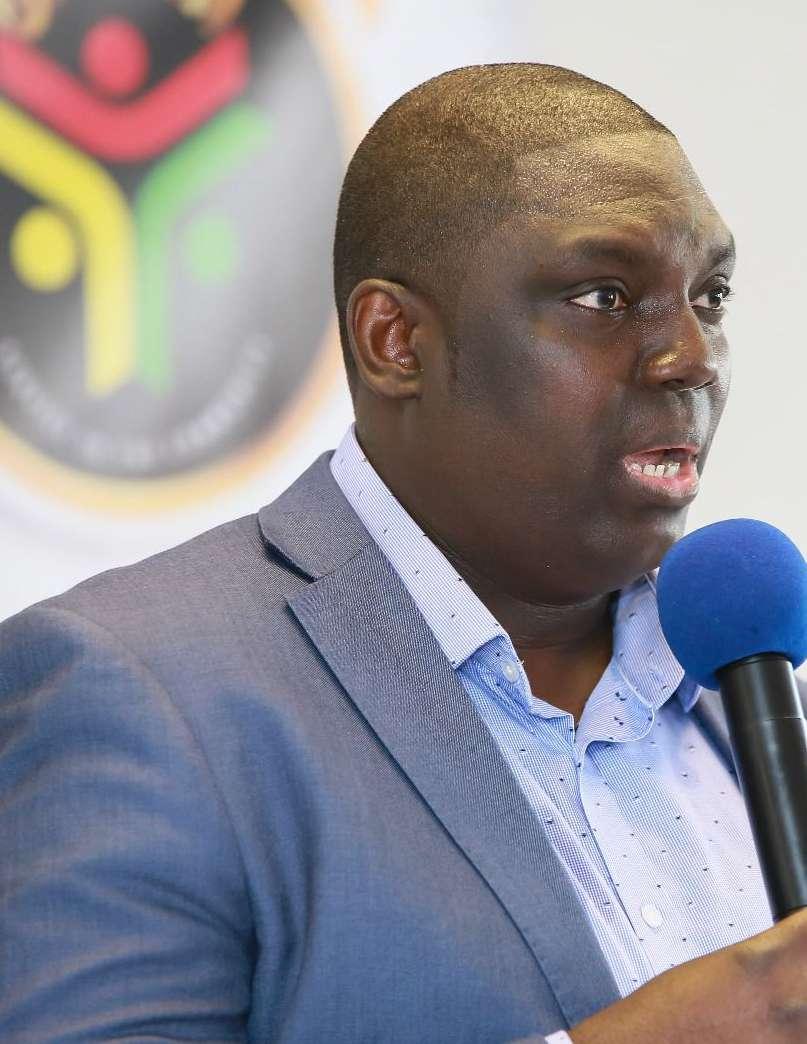







, I came to England to pursue a Master’s degree in Human Resource Management and Industrial Relations at Keele University. My thesis, The Impact of Training and Development on the Retention of Social Workers, reflected my
growing interest in the profession and its workforce challenges. Upon completing my degree, I registered with the then-General Social Care Council and started my career as a Social Work Assistant. This marked the beginning of my journey into frontline social work.

In the years that followed, I embraced every opportunity to grow and contribute. I moved to Birmingham and progressed through various roles: Social Worker, Senior Social Worker, Senior Practitioner, Practice Supervisor, and Practice Educator.
Each role provided a deeper understanding of the complexities within the system and the challenges faced by children, families, and social work professionals.
In 2013, I became an Independent Reviewing Officer (IRO). This role allowed me to provide oversight for children in care, ensuring their voices were heard and their needs met. Simultaneously, I served as a Keeping the Church Family Safe officer in my local church. It was in this role that I observed a troubling disparity in services for minoritised communities.

saw countless African and ethnic minority
families struggle with child protection concerns, often due to cultural
misunderstandings or a lack of knowledge about local safeguarding frameworks. This gap in understanding frequently resulted in children being accommodated into Local Authority care. Recognising the urgent need for culturally competent support, I brought together Ghanaian social workers I had met across the Midlands. In February 2018, the Ghanaian Social Workers Association (GHASWA) was born.













GHASWA started as a small group of professionals united by a shared purpose: to support African families navigating the social care system. Over time, it grew into a powerful network. Through GHASWA, we have supported numerous families, offering guidance during child protection enquiries and facilitating reunifications.


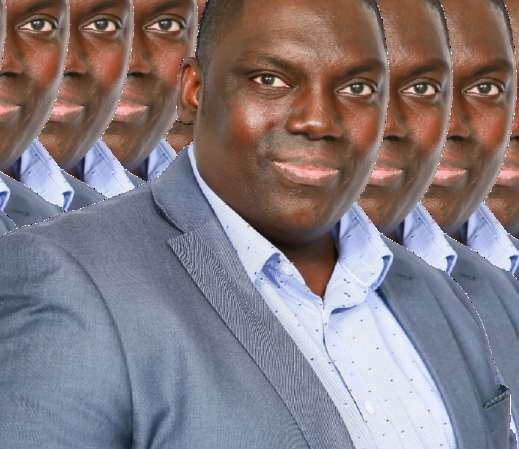
During the pandemic, we launched GHASWA Outreach, a series of weekly online sessions on Facebook designed to educate and support families in real-time. These sessions provided a lifeline to families struggling with isolation, safeguarding concerns, and systemic barriers.

In September 2023, GHASWA hosted its first National Conference for Black and Minority Social Workers in the UK, which attracted over 80 participants. Titled Tackling the Challenges Faced by Ethnic Minority Social Workers in the UK, the event highlighted systemic inequities and proposed actionable solutions to support professionals and families alike.



While GHASWA made significant strides, it became clear that we needed a broader platform to reach families from diverse backgrounds. This led to the founding of African and Minority Families Support Services CIC (AFRIFASS) in December 2023.
AFRIFASS was established to provide bespoke, culturally competent support to African and minority families. In 2024, we are set to launch our flagship initiative: the Parenting Support for Minority Families Project, funded by the National Lottery Community Fund. This project will equip families with the knowledge, tools, and confidence to navigate parenting challenges while addressing cultural dynamics that often lead to safeguarding concerns.


















My journey has been enriched by various voluntary roles. I served as a Safeguarding Parent Governor at a local school, where I championed child protection policies. As a trustee at the National Association of Independent Reviewing Officers (NAIRO), I worked to improve standards for children in care. I have also been part of the National Working Group for Child Abuse Linked to Faith and Belief, now known as SARA. Recently, I joined the African Heritage Collaborative Network, a coalition aimed at amplifying the voices of African communities in the UK.
Through these roles, I have seen firsthand the power of advocacy and collaboration. Whether supporting families through child protection enquiries or influencing policy discussions, I remain committed to championing the needs of minorities communities.

My passion for advocacy has not come without challenges. There have been times when my work was misunderstood or met with resistance. I have faced the loss of employment and opportunities while fighting for equitable treatment for families and professionals. Yet, these setbacks have only strengthened my resolve. I believe in the importance of standing firm for what is right, even when it comes at a personal cost.

he success stories make it all worthwhile. Seeing families reunited, children thriving, and social workers empowered to challenge systemic inequalities reminds me why I chose this path I would not trade this journey for anything in the world

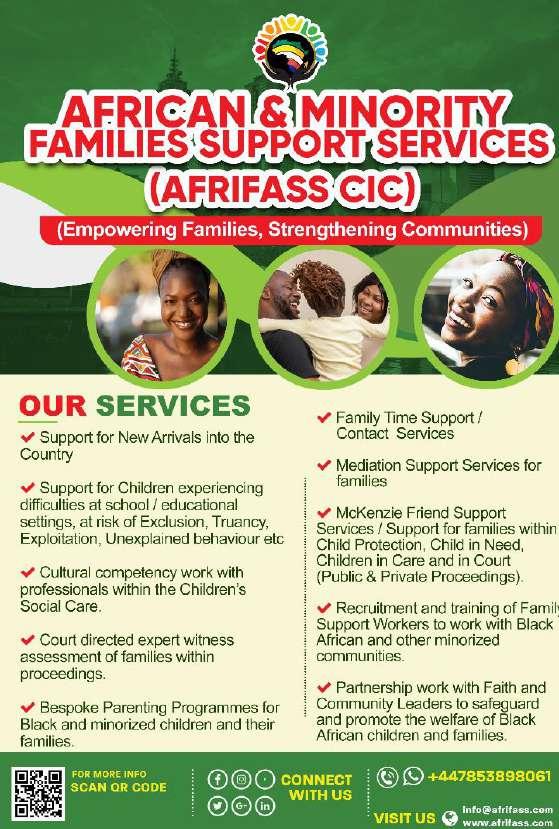











As the CEO of AFRIFASS and President of GHASWA, I am excited about the future. I envision a society where every family, regardless of their background, has access to the support they need to thrive. I hope to continue fostering partnerships, creating spaces for dialogue, and delivering projects that make a tangible difference
My journey from aspiring diplomat to social work advocate has been one of growth, purpose, and unwavering commitment I am grateful for the opportunities I have had to serve, and I look forward to continuing this work for years to come.
“Wecannotalwaysbuildthe futureforouryouth,butwe canbuildouryouthforthe future.”

These words resonate deeply with me as I strive to build a legacy of empowerment, inclusion, and justice for families and communities
across the UK
Educationalarticles, resources,andinformation tosupportfostercarers, providingvaluableinsights, tips,andguidanceon variousaspectsof fostering.

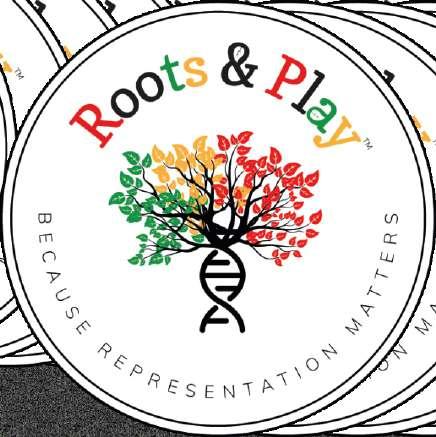

pushed for more representation in children’s books, but I wanted to go further. That’s how Roots and Play began with a set of Caribbean food flashcards honoring my heritage


This work is deeply personal When I had my son, it hit me even harder how crucial representation is. Watching him, now 18 months, grow into his culture while playing the flashcards I created fills me with pride. He’s learning about his roots, his traditions, and his identity all through play













oots and Play isn’t just about flashcards; it’s about creating tools that help children see themselves in the world. Research backs this up: when children have access to materials that reflect their culture, it boosts self-esteem, builds a positive self-image, and sets them up for success as they grow.
But it’s not just for kids from Black or ethnic minority backgrounds. These resources also help children outside those cultures learn about and appreciate diversity, breaking down stereotypes and encouraging connection.











When it comes to children in care particularly in transracial placements, cultural identity can often be overlooked. That’s where Roots and Play steps in. Our flashcards can act as a bridge, helping foster carers connect with the children they care for on a deeper level.
Think about this: a foster carer and a child from a Caribbean background are sitting down to play a simple game of snap. Instead of regular cards, they’re using Roots and Play Caribbean food flashcards. As they play, the child starts sharing memories tied to the foods—maybe stories about their family or traditions they miss. The carer listens, learns, and connects.



That small moment of play creates something powerful: understanding, acceptance, and a sense of belonging. It shows the child that their culture matters and that their carer values and
For carers, it’s a way to start exploring the child’s cultural identity without feeling overwhelmed. It’s a springboard for deeper conversations and sharedexperiences,likecookingatraditionaldish togetherorexploringthestoriesbehindthefoods. respectsit.





















Forme,thisisn’tjustaboutsellingaproduct.It’s aboutsparkingconversations,drivingchange, andcelebratingcultureinawaythatfeels accessibleandfun.LivingintheWesternworld, I’veseenhoweasyitisforculturalheritagetoget pushedasideorhiddenaway.RootsandPlayis aboutbringingittotheforefront—makingit somethingtobecelebratedandshared.


It’s
Iwant kids to feel proud of who they are, to know their roots matter,andtocarrythatpridewiththemastheygrow.Iwant carers and educators to have tools that make diversity and
inclusion part of everyday life, not just something we focus on during Black History Month or special occasions.
























The dream? For Roots and Play to be in schools, nurseries, and homes across the country. I want our flash cards to be used year-round—notjustasafunactivity,butasameaningfulway topromoteinclusivityandculturalawareness.
I also want to partner with schools and community groupstomakerepresentation a priority in education. It’s about creating a future where all children feel seen, valued, and empowered by their heritage.
Roots and Play is more than a businesstome.It’samission— a way to challenge the status quo and celebrate the beauty of diversity. Whether you’re a parent, educator, or carer, I hope you’ll join me in creating a world where every child knows their roots are worth celebrating.





























In a world where behavioural challenges can often feel insurmountable, Aluna Behaviour Consultancy stands as a beacon of hope and transformation. F o u n d e d i n A p r i l 2 0 2 2 , w i t h t h e fundamental objective of affecting behavioural change for happier andmore fulfilling lives, Aluna's work spans across children and young people, families, adults and professionals. It offerspractical support and insight into a myriad of behaviours through specialist training, workshops and coaching opportunities.
At the helm of the business, I’m a Behaviour Strategist with 30 years of teaching and education experience. This extensive background provides a rich tapestry of skills, comprehensive knowledge and expertise, all aimed at promoting positive and permanent change. The consultancy's approach is rooted in the belief that effective intervention at the earliest stage possible is key to breaking the cycle of learned and generational patterns of dysregulation. The principles of Advocacy, Liberty, Understanding, Nurturing and Aspiration underpin and guide its passagetotrue,authenticinclusion.
Aluna Behaviour Consultancy's mission is clear: to create a climate where behaviours that challenge are met with understanding, support and effective strategies for change. By working closely with all stakeholders, Aluna is making a tangible difference in the lives of those it serves. The consultancy's ethos is driven byfosteringrelational,trauma-awareand anti-racist practices. Such a holistic approach shifts the focus from problematic actions to positive qualities, fostering wholly inclusive practices in all sectors of the education and care systems. Every conversation, every interaction, is an opportunity to learn and grow.
When I was 7 years old I was told that I was “unique” and special. I didn't know what it meant, but I knew I liked it!! The phrase is one of those gifts in life I call a "golden nugget"; something you can draw upon to remind you how awesome you are when you're unsure or doubting yourself. It prompts you to remember how importantyourcontributionistotheworld anddoeswondersforyourself-esteem.
MarkFinnis,authorofIndependentThinkingonRestorative Practice,hassomegreatgoldennuggets,myfavourites being:
Labelsbelongonjars.
Relationshipsaren'tbuiltinaday,they'rebuiltdaily.
Changethebehaviourbymeetingtheneed.
Lovedchildrengotoschooltolearn,childrenwhoaren'tlovedgotoschooltobeloved.
Somanytimes,wearejudged,caricaturedandtypecast.Asa4foot8Blackfemale,I'mwellawarethatmy physical appearance is a one-off, but I challenge being called “different”. We're all unique and I refuse to accept that I – and the young people I work with – should be labelled as anything else!
Diversity, Equity and Inclusion is not simply a trope to highlight differences but it exists t o c e l e b r a t e individualism. It's a b o u t c r e a t i n g environments where everyone feels valued a n d i n c l u d e d , regardless of their b a c k g r o u n d o r characteristics My
w o r k s t r i v e s t o promote DEI by being empathetic and responsive to the needsofeachoneofus
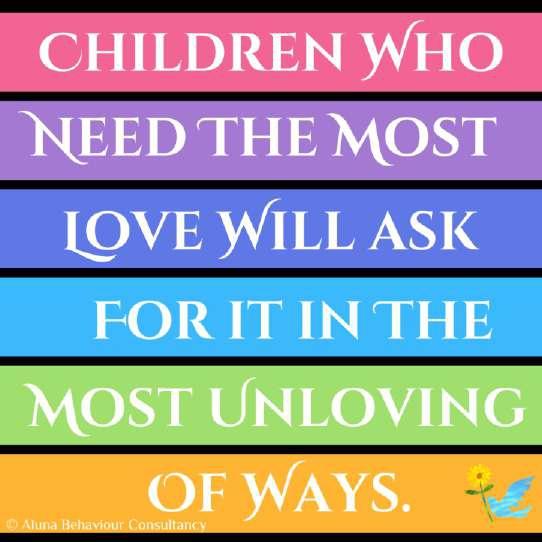
My journey is a testament to the power of embracing uniqueness By challenging stereotypes, we can break down barriers and build a more inclusive world. Every action counts Let's continue to honour our idiosyncrasies and view them through a judgement-free lens. After a l l , o u r p a t h t o self-actualisation is a worthy accolade to be proud of
As we look ahead, how to prioritise the needs of future generations becomes increasingly urgent. Thechallengesfacingoureducationandsocialcare systems are multifaceted and addressing them effectively requires a comprehensive and
full potential. Conversely, unmet emotional needs lead to poor wellbeing, disengagement and a decline in academic performance. Being a “behaviour detective” serves to explore what are sometimes chasms in young people’s emotional development. Their actions, however undesirable, aretheironlyoutletthroughwhichtocommunicate theirasyetunmetneeds. coordinatedapproach.
When emotional needs are met, young people engage positively, develop strength and exhibit resilience in the face of challenges to achieve their

Engagement between children-centred agencies is not just beneficial, it is imperative. Aluna Behaviour
Consultancy plays a significant part in supporting young people at school and their families at home. Working in both settings gives the 360° perspective that influences all future work. Only through such collaboration can we craft a future where every young person is given the opportunity to thrive, to rise above challenges and to reach their fullest potential. The stakes have never been higher. The time to act is now. Let us commit to this cause with the urgency and passion it demands, for the future of our children rests upon it. Their lives depend on the actions we take today; an opportune time to pledge a commitment to theirwellbeingandaninvestmentintheirfuture.
My work with children, young people and their families relies upon a relational and strategic approach. Differentiated responses involves being attuned to each young person's context and to respond withempathyandcare,knowingthe underlyingcausesoftheirbehaviour rather than merely addressing the symptoms. Strong, supportive connections between young people, educators and caregivers are at the heart of relationships built on trust, feeling valued and mutual respect. Forming these bonds requires time, effort and a commitment to a compassionate and equitable society.
My work with children, young people and their families relies upon a relational and strategic approach. Differentiated responses involves being attuned to each young person's context and to respond with empathy and care, knowing the underlying causes of their behaviour rather than merely addressing the symptoms. Strong, supportive connections between young people, educators and caregivers are at the heart of relationships built on trust, feeling valued and mutual respect. Forming these bonds requires time, effort and a commitment to a compassionateandequitablesociety.
The path ahead demands an unwavering, united effort from all corners of society; government, local authorities, schools, and social care agencies alike. We stand at a pivotal moment, where the choices we make will echo through the lives of the next generation. In order to truly prioritise the needs of our youth, we must radically rethink the funding of essential services, ensuring that resources flow to wheretheyaremostdesperatelyneeded.Wemust be keeping our young people in school; not excluding them. We must be trauma informed; not retraumatise them with our cold, punitive actions. We must be activists and upstanders for their rights; not allowing them to be discriminated against and ostracised. We must be the adults of todaythattheywillaspiretobecometomorrow.
































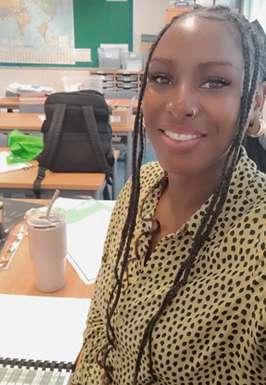

orking in these roles, I’ve had the privilege of supporting looked after
children (LAC), and I’ve witnessed both the challenges, and the progress made in recent years. In some schools I’ve worked in, LAC students were often overlooked, with limitedsupportinplacetohelpthem keep pace with their peers. This lack of attention not only affected their academic progress but could also contribute to behavioural issues. Many LAC students have experienced trauma, loss, or instability, which can affect their emotional well-being and ability to form trusting relationships. These emotional challenges may manifest as anxiety, behavioural issues, or difficulties with peer interactions, making them more vulnerable in the schoolenvironment.
























Kianne has dedicated nearly a decade to teaching secondary students, bringing passion and expertise to her classroom. Alongside her teaching responsibilities, she has embracedleadershiprolessuch as Head of House and Pupil PremiumChampion.
Now, as a Head of Department Kianne takes on a pivotal role in ensuring the educational success of looked-after and previously looked-after children. This leadership position is vital in creating a school-wide culture that prioritises the unique needs of these students.
While some looked after children achieve well, as a group their overall educational outcomesremainunacceptably low. ‘Prior to the pandemic in 2019, looked after children were almost 2.5 years (29 months) behind their peers across GCSE English and maths’ (Education Policy institute). LAC students often face disruptions in their education due to placement changes, resulting in them attending multiple schools.





By fostering an environment that values personalised learning, Kianne works to address their personal, emotional,andacademicneeds withcareandprecision.
Her work highlights the importance of advocating for vulnerable students and ensuring they have the resources and support needed to thrive. Through her efforts, Kianne exemplifies how dedicated educators can make a lasting impact, not only in the classroom but throughout the school community.
These frequent transitions can lead to gaps in learning, loss of friendships, and a lack of continuityinacademicprogress and support. In addition, due to past experiences, LAC students may struggle with forming attachments or trusting adults, including teachers. This can hinder their ability to seek help or engage fully in school life, leaving them feeling isolated or unsupported. Being in care can sometimes result in a sense of stigma or being labelled by others. This may lead to a lack of understanding from peers or staff, which can further isolate LAC students or affect their self-perception.
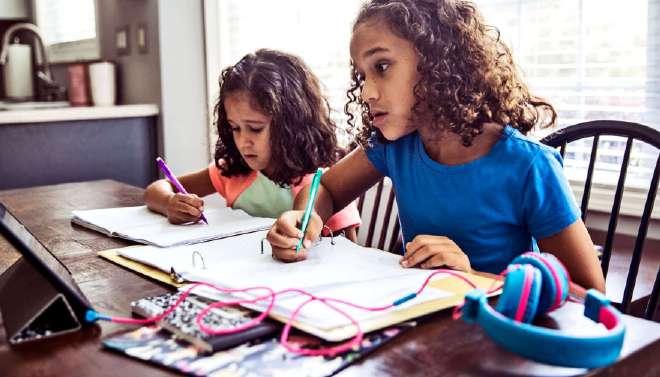
Every child in care deserves the same opportunities and outcomesandshouldensure the highest possible educational standards and outcomes for all looked after and previously looked after children (S52, Children Act, 2004). Thankfully, there has been a shift in how schools approach the needs of thesechildren.
More schools now assign dedicated staff members to oversee the well-being and progress of LAC students. Some schools also have family support workers, who play an essential role in ensuring families and carers have the resources they need, from completing paperwork to securing vital support services. At my school, we have Pupil Premium Champions who act as associates to make sure any student lacking the necessary support or struggling to make progress is paired with a 1:1 mentor. Thisstructured,personalised approach has significantly boosted the academic development of our LAC students, ensuring that they no longer fall behind but thrivealongsidetheirpeers.

Herearesometoptipsforfostercarersof secondaryschoolstudentsfroma teacher'sperspective:
1.Establishstrongcommunicationwiththeschool: Regularcontactwithteachersandsupportstaffensuresyou'reup todateonthestudent'sprogress,behaviour,andanyconcerns. Buildingarelationshipwiththeschool'sdesignatedpersonfor lookedafterchildrenisespeciallyimportant.
2.Createasupportivehomeenvironmentforlearning: Encourageaconsistentroutinethatincludestimeforhomework, reading,andrevision.Providingaquiet,distraction-freespacefor studycanhelpthemfocusandfeelsupported.
3.Encourageresilienceandperseverance:Secondaryschoolcan bechallengingbothacademicallyandsocially.Celebrateeffort, notjustachievement,andreinforcethevalueofstickingwith difficulttasks,evenwhenprogressseemsslow.
4.Beinvolved,butdon’toverwhelm:Fosterchildrenmayneeda balancebetweenindependenceandsupport.Attendschoolevents, parents'evenings,andsupportlearningactivities,butalsogive themroomtonavigatetheirschoolexperience.
5.Supporttheiremotionalwell-being:Schoolcansometimes triggeremotionslinkedtopasttrauma.Bepatientandprovide reassurance,remindingthemthatsetbacksarenormal.Encourage themtoseekhelpfromschoolstaff,likecounsellorsormentors, whenneeded.
6.Promoteextracurricularinvolvement: Encourageparticipation inafter-schoolclubs,sports,orotheractivitiesthatalignwiththeir interests.Thiscanhelpboosttheirconfidence,buildfriendships, anddevelopnewskills.
7.Helpwithgoal-setting: Workwiththemtosetrealistic academicandpersonalgoals.Thisgivesthemsomethingtowork towardandcanprovideasenseofachievementastheyreach milestones.
8.StayinformedaboutPupilPremiumsupport: Schoolsoften haveadditionalresourcesforlookedafterchildrenthroughPupil Premiumfunding.Makesuretheyarebenefitingfromanyavailable tutoring,mentoring,orextracurricularopportunities.

Byfosteringstrongcommunication,creatingastableenvironment, and offering balanced support, you can help them thrive during theirsecondaryschoolyears.


ConnectionsandCollobation:
Highlightingorganisations'initiatives. Buildingconnectionsandfosteringa senseofcommunitywithinyour readers.
At DOOPS Academy, we believe that every child deserves to feel celebrated and cared for, no matter their circumstances. Founded in Leicester, DOOPS Academy has become a trusted resource for families learning to care for Afro-textured hair. Our work began by addressing a need we saw firsthand: children incareoftenlackaccesstoappropriatehaircare,leavingthemfeelingoverlookedormisunderstood.
This February, we’re proud to host Crowned with Care,aspecialone-dayeventdesignedtomake a difference in the lives of Black children and teenagers in the care system. Held at the Afro Caribbean Centre in Leicester, the event offers free hairstyling and grooming services to 100 children aged 5–18. But this day is about much more than hair. It’s about boosting self-esteem, celebrating cultural identity, and providing practical support for carers who may not be familiarwithAfro-texturedhair.
The event brings together skilled hairstylists, braiders, and barbers who share our mission to create a nurturing and empowering space. Each child will also receive a bespoke hair care box, ensuringtheyleavenotjustwithafreshstylebut withtoolstomaintaintheirhairconfidently.


Forchildrenincare,somethingassimpleasa hairappointmentcanbetransformative.Hairis deeplytiedtoidentity,andbyofferingthese services,weaimtoshoweverychildthatthey arevaluedandseen.Ourworkalsoextendsto educatingcarers,helpingthemunderstandtheculturalandpracticalaspectsofAfrohair care,fosteringlong-termpositivechange.








at










CrownedwithCareisjustthebeginning.AtDOOPSAcademy,we aspiretoexpandourreach,offeringsimilarinitiativesacrossthe UKtosupportevenmorechildrenandfamilies.Bybuilding partnershipswithlocalbusinesses,organisations,and communities,we’recreatingamovementthatcelebratesdiversity andinclusion.
We hope this event will inspire others to take action whether by supporting events like ours or simply by recognisingtheimportanceof representation and care in everyaspectofachild’slife.
Together, we can make sure every child feels proud of who they are and equipped to thrive,onebraid,twist,andtrim atatime.



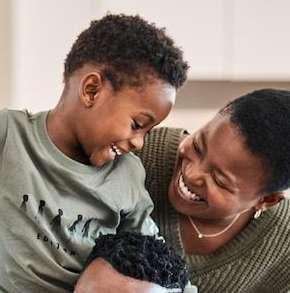



Two-thirds of councils in England have a shortage of Black and mixed-race foster carers. In Brighton & Hove, as morechildrenfromethnicbackgrounds
come into care, the Council are urging people from Black and mixed-race communities to consider becoming foster carers. Identity is important for all children but it is particularly crucial for Black and mixed-race children placedinfostercaretogrowupunderstanding their roots and their culture as well as the day todaycareofskinandhair.
Black and mixed- race foster carers are often well placed to help foster children from the same background, as they can help children to developasenseofprideandachievementand to help them make better sense of their history and identity and the importance of representation.
TheBrighton&HoveCityCouncilfosteringteam feel privileged to have continued to meet and work with Black and mixed race people in the community, from those who own and run local shops and businesses, to those who meet and connect in community space, to mentors, musicians, entrepreneurs, leaders, young people and foster carers. The team welcome invitations to spaces where they can talk about
what Black and mixed race children in care need and find ways to help spread the message about fostering. This work and building of relationships is key to ensuring that meaningful, authentic and consistent change and impact is possible for children in care as well as for the foster carers who care for them.
Melody Duhaney, Certified Personal Trainer & Nutritionist, provides Black and Multi-heritage
Hair&SkinCareworkshopsforBrighton&Hove foster carers. She says "Black hair plays a significant role in cultural identity and self-esteem, going beyond mere grooming. For children in care, particularly those from varied backgrounds. Many of these Children find themselves in situations where their culturalneedsmaynotalwaysbeprioritised
or fully understood. In light of this, Brighton has taken a commendable step by offering workshops that ensure every child in their care, irrespectiveofbackground,receivestheproper attention they deserve. These workshops are aimed at educating staff and carers about these unique needs. Kudos to Brighton and Hoveforthisimportantinitiative"!
CathySeiderer,thecouncil’sFostering
Recruitment and Assessment
Manager, saysk: “We thank thoseinthecommunitywho come along to spaces to talk about fostering with us. We sit in these spaces wanting to make sure we are listening and then taking action. We have our critical friends who are on this journey with us for ourchildrenincareandweappreciatethis.”
Young people in care have said what is important to them. They have shared stories and advised what works and what hasn’t. That is their story and that’s important. These experiences and their request to have more representation is a
drivingforcetogetthisright.
Cathy says “we are so pleased to have connected with Rachel and her team doing great work at Black Foster Carers Alliance (BFCA) and we will continue to share and encourage staff and carers to attend her training to support our children in care. We are excited to continue this journeyandalsofindoutotherways,of by working with BFCA and how we cab recruit
moreBlackfostercarers.
One of the key areas that we are reminded ofishowimportantitisforustobustmyths. That we need to make it more obvious that you can be single and foster, that you don’t have to own your own home, that you don’t need to have had your own children, that youcanworkandfoster.

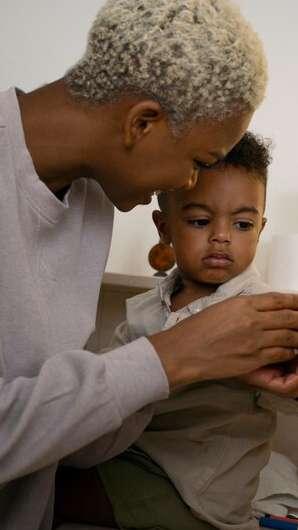
People rule themselves out for various reasons butfostercarersoftensay“justaskthequestion and find out more….don’t rule yourself out!”
Cathy and her team are looking forward to welcoming new foster carers on a journey to foster, or to support others to foster. Children need us to all play a part and if fostering isn’t something that is possible for you, please do whatyoucantospreadtheword.
Articlesfocusingontraining, cultural competency, and empowering foster carers with knowledge and skills.



Myjourneyinsocialcarebeganasacontactsupportworker,whereIsupervisedinteractionsbetween looked-after children and their family members in Leicester. It was a role that opened my eyes to the struggles faced by many children in care, especially those of Black heritage placed with predominantly Caucasian families. Over time, I began to notice a gap—an unaddressed need that went beyond the general caregiving framework. This was the need for culturally sensitive care, particularly in the areas of hair and skin care, which are vital components of identity and self-worth forBlackchildren.
This realisation was the seed that led to the creation of Ethnic Care—a tailored initiative designedtosupportthecarersofchildrenof African,Caribbean,Dual,orMixedHeritage.
Ethnic care exists to do more than just offer practical advice. Our mission is to help children embrace their cultural identity with confidence, nomatterthecircumstances.Toooften,children in care struggle with low self-esteem and identity confusion, particularly when they are unable to connect with their cultural roots. We believe that the journey toward cultural empowerment starts with something as simple yet profound as helping these children feel comfortableintheirownskin—literally.
Black ethnic hair and skin care are unique and requirespecialattention.Forexample,Blackhair comesindifferenttextures—straight,wavy,curly, and kinky. Kinky hair, in particular, is highly delicate. When African-Caribbean hair is exposed to moisture, it can shrink up to 80% of its length, and humidity can cause further challenges. This hair type also tangles easily, requiring specific care to maintain its health andbeauty.
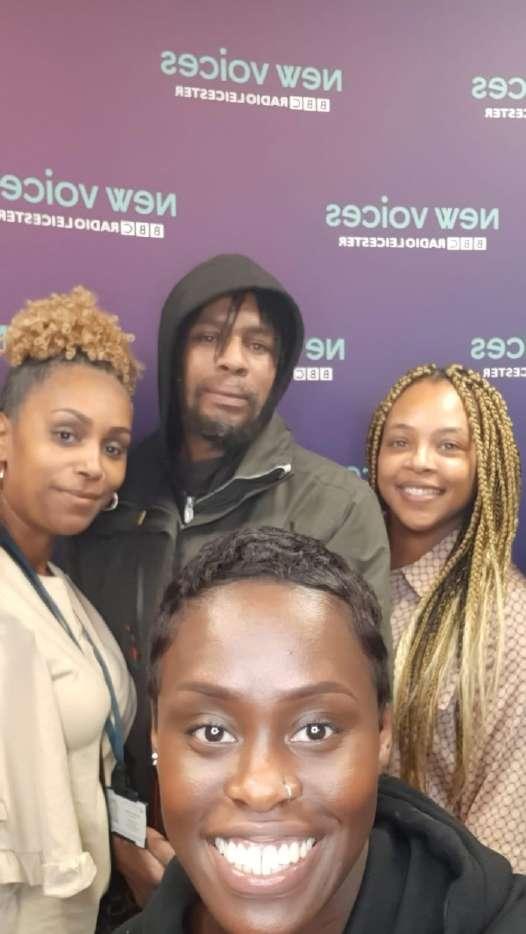

Similarly, Black skin requires a tailored routine. Richinmelanin,Blackskintendstobedrierand can appear ashy if not properly moisturised. Daily skin care is not just about appearance —it’saboutmaintaininghealthandconfidence.
Through Ethnic Care, we aim to equip foster carers and social workers with the knowledge and skills necessary to care for Black children’s hair and skin in a culturally respectful way. We recognizethechallengemanycarersfacewhen managing the care of children whose cultural needs they may not fully understand. That’s why Ethnic Care will provide workshops, tutorials, one-on-one consultations, and educational materials that cover all aspects of ethnichairandskincare.
More importantly, this is about empowering childrentofeelprideintheirculturalheritage.By embracing their natural hair and caring for their skin, children can develop a strong sense of self that nurtures both their confidence and their identity.
We also recognise the broader issue of a shortage of foster carers from Black and minority ethnic backgrounds. This means that manychildren ofBlack heritage areplaced with families who might not be familiar with the specific needs of their care. While the love and dedication of these families are undeniable, they may need guidance in areas that are essentialforthechild’sself-esteemandcultural connection.

EthnicCare’sprimarygoalistomakesurethatall childrenincare,regardlessofwheretheyare placed,receivethepersonalcaretheydeserve.
Ourfocusison:
EducatingcarersandprofessionalsonthespecificneedsofBlackchildren’shairandskin care.
Teachingchildrenandyoungpeopletheimportanceofself-careaspartoftheircultural identity.
TargetingtheMidlandsregioninitially,withplansfornationalexpansion.
Encouragingchildrentoembracetheirnaturalhair,celebratingtheiruniquenessandbeauty. Supportingcarersandprofessionalswith practicalknowledgeandtoolstomeetthese needs.
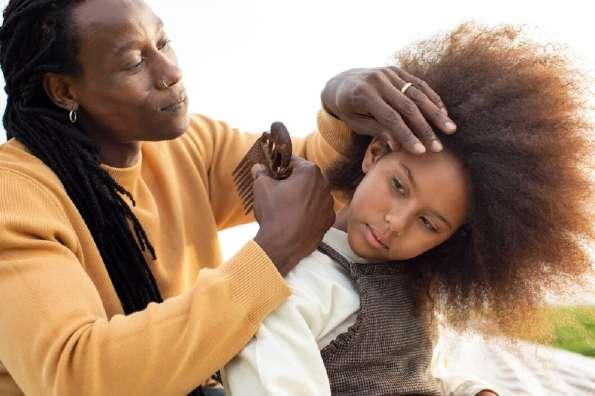
I will bring Ethnic Care to life and achieve these
Not forgetting our "Black males" as they too may need a hair cut, locking or braiding, uplifting and empowering a generation of children to stand tall, confident in their appearance, heritage, and culture, no matter goals. childrenintheircare. thechallengestheyface.
Ethnic Care will also provide the stepping stone weneedtoensurethatcarersandprofessionals are equipped to nurture the cultural identity of
Thank you for your interest in the Voice of the Alliance! We welcome contributors for future magazine editions and encourage you to share your stories, highlighting the great work you're doing to support carers, social workers,andthechildrenandyoungpeopleyouserve. IFYOUWOULDLIKETOADVERTISE YOURSERVICES ORBUSINESS PLEASEGETINTOUCHWITHUS:
blackfostercarersalliance enquiries@blackfostercarersalliance.co.uk 08000016230 www.blackfostercarersalliance.co.uk